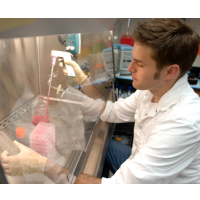Younger Scientists Losing Out on Research Grants
 (AP photo)
(AP photo)
An alarm has been sounded that the very future of science is at risk. Young scientists are increasingly being denied research grants, a trend that has been growing for more than a decade and resulting in a brain drain from biomedical academia.
Ronald Daniels, president of Johns Hopkins University, says in a new research paper (pdf) that the number of principal investigators (scientists) 36 years or younger with a National Institutes of Health grant declined from 18% in 1983 to only 3% by 2010.
In addition, the average age of medical researchers getting their first NIH grants has increased from just under 38 years old in 1980 to more than 45 in 2013.
The continued loss of young scientific minds from the academic arena, in Daniels’ view, “could lead to a gradual evaporation of new discoveries, the loss of future leaders and mentors, a less diverse workforce and the loss of scientists at what should be a pivotal point in their career,” reported John Hopkins in a press release.
“The implications of these data for our young scientists are arresting,” Daniels wrote in his paper, published in the journal Proceedings of the National Academy of Sciences. “Without their own funding, young researchers are prevented from starting their own laboratories, pursuing their own research, and advancing their own careers in academic science. It is not surprising that many of our youngest minds are choosing to leave their positions.”
Daniels says there are three reasons why it has gotten harder for young scientists to get research funding: longer training periods, a grant system that favors more established scientists, and increases in research costs borne by universities.
“The inability to staunch — if not reverse — the above trends stands as an urgent and compelling policy challenge,” Daniels wrote. “The current stewards of the U.S. research enterprise bear a responsibility to sustain and safeguard that enterprise so that it can provide a platform for the scientists and the science of generations to come.”
The U.S. currently ranks 10th among OECD nations in terms of investments in research and development, according to a recent report (pdf) from the American Academy of Arts and Sciences. America's financial investment has remained between 2.5% and 3% of GDP during the past two decades, while other nations, such as China, have increased their research investments by as much as 8% annually.
-Noel Brinkerhoff, Danny Biederman
To Learn More:
A Generation at Risk: Young Investigators and the Future of the Biomedical Workforce (by Ronald Daniels, PNAS) (pdf)
Science at Risk as Young Researchers Increasingly Denied Research Grants (Johns Hopkins University)
- Top Stories
- Unusual News
- Where is the Money Going?
- Controversies
- U.S. and the World
- Appointments and Resignations
- Latest News
- Trump Orders ICE and Border Patrol to Kill More Protestors
- Trump Renames National Football League National Trump League
- Trump to Stop Deportations If…
- Trump Denounces World Series
- What If China Invaded the United States?






Comments